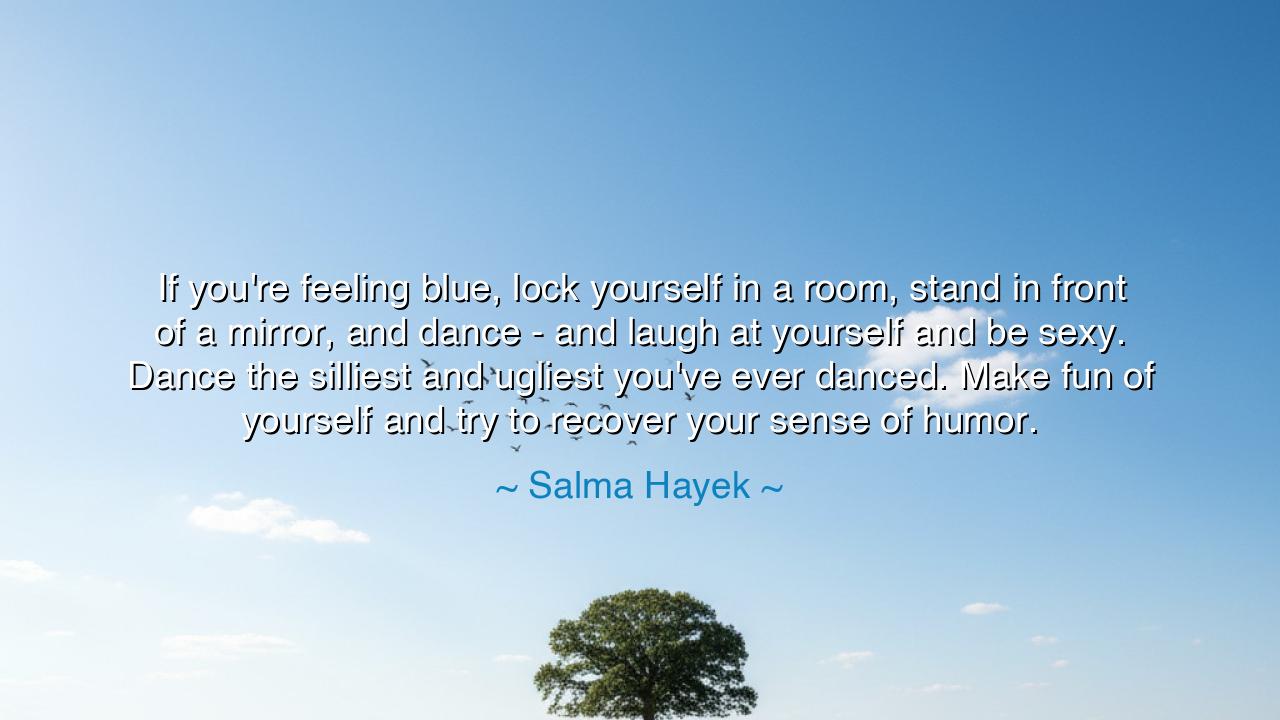
If you're feeling blue, lock yourself in a room, stand in front
If you're feeling blue, lock yourself in a room, stand in front of a mirror, and dance - and laugh at yourself and be sexy. Dance the silliest and ugliest you've ever danced. Make fun of yourself and try to recover your sense of humor.






The words of Salma Hayek, “If you're feeling blue, lock yourself in a room, stand in front of a mirror, and dance — and laugh at yourself and be sexy. Dance the silliest and ugliest you've ever danced. Make fun of yourself and try to recover your sense of humor,” shine like a torch in the darkness of sorrow. Beneath their playfulness lies a deep and ancient wisdom — the understanding that joy and self-compassion are not found by fleeing from pain, but by meeting it with courage and laughter. In her words, Hayek offers a sacred ritual for the spirit — one that invites us to reclaim our power through the simple, divine acts of movement, laughter, and self-acceptance.
In every age, the wise have known that the body and the soul are bound together by invisible threads. When the body moves, the spirit stirs. When the voice laughs, the heart lightens. The ancient Greeks, who saw art as medicine, danced not only in celebration but in healing. They believed that dance could release the poisons of grief and restore harmony between body and mind. The philosopher Plato himself said, “He who does not dance knows not what will come to pass.” Thus, when Hayek urges us to “dance the silliest and ugliest you've ever danced,” she is calling us back to this primal medicine — the dance of freedom, where pride dissolves and the soul breathes again.
There is power in her command to “laugh at yourself.” For laughter, when directed inwardly with kindness, is the purest act of forgiveness. It disarms the ego, that stern guardian of our image, and invites humility, grace, and warmth back into the heart. In the mirror, as we watch our foolish gestures and exaggerated moves, we are reminded that perfection is an illusion. We see ourselves not as flawless statues but as living, breathing, imperfect beings — and that imperfection is beautiful. To laugh at oneself is to reclaim dominion over sadness; it is to declare, “I am not trapped by my sorrow — I am greater than it.”
In her wisdom, Hayek also speaks of being “sexy” in that moment — not in the shallow sense of vanity, but in the deeper sense of vitality. To feel “sexy” in the face of sadness is to reawaken the energy of life itself. The ancient Egyptians taught that sensuality — the joy of being in one’s body — was a divine gift, a reminder that the human form was sacred. To move sensually, to feel one’s own strength and beauty, is to reconnect with that divine spark. It is a rebellion against despair, a dance of resurrection. When we move with such awareness, we are not merely cheering ourselves up — we are summoning the life force back into motion.
Consider the story of Charlie Chaplin, the great silent comedian who made the world laugh even as his own life was touched by hardship and loneliness. When asked how he created his art, he said, “To truly laugh, you must be able to take your pain and play with it.” His humor was not born of ignorance, but of transformation — the alchemy of turning sorrow into laughter, of turning despair into performance. In this same spirit, Hayek’s advice is not trivial; it is spiritual defiance. To dance before a mirror in one’s sorrow is to declare oneself unconquered. It is to take what wounds us and turn it into rhythm and light.
The mirror, too, holds symbolic power in her teaching. It is both a teacher and a challenger. To stand before it while we dance is to confront the truth of ourselves — stripped of roles, masks, and pretense. It is to meet the self not as others see us, but as we are. The ancients regarded the mirror as a portal to the soul; in some traditions, it was used for self-revelation, to see beyond illusion. When Hayek tells us to laugh at what we see there, she is urging us toward self-compassion — to look upon our reflection not with judgment, but with humor and love. For the one who can laugh at their reflection has made peace with their humanity.
Let this then be the teaching: Healing is not solemn; it is playful. Do not let sorrow turn you to stone. When sadness comes, answer it not with silence, but with movement. Lock yourself away not to hide from the world, but to rediscover your strength in solitude. Dance until the heaviness falls from your shoulders; laugh until your heart remembers its lightness. In that laughter, you will find what philosophers and mystics have long sought — the secret of joy that cannot be broken by circumstance.
For in truth, as Salma Hayek reminds us, the cure for despair is not denial, but participation in life. When the heart grows dim, move your body. When you forget your worth, face the mirror and smile. When the world feels cruel, make fun of yourself gently, and you will remember that kindness begins within. To dance, to laugh, to play — these are not small acts. They are the gestures of the soul reborn, the signs of a human being who, even in darkness, still dares to choose light.






AAdministratorAdministrator
Welcome, honored guests. Please leave a comment, we will respond soon